#International Support Network for African Development
Explore tagged Tumblr posts
Text
"In one of Africa’s last great wildernesses, a remarkable thing has happened—the scimitar-horned oryx, once declared extinct in the wild, is now classified only as endangered.
It’s the first time the International Union for the Conservation of Nature (IUCN), the world’s largest conservation organization, has ever moved a species on its Red List from ‘Extinct in the Wild’ to ‘Endangered.’
The recovery was down to the conservation work of zoos around the world, but also from game breeders in the Texas hill country, who kept the oryx alive while the governments of Abu Dhabi and Chad worked together on a reintroduction program.
Chad... ranks second-lowest on the UN Development Index. Nevertheless, it is within this North African country that can be found the Ouadi Rimé-Ouadi Achim Faunal Reserve, a piece of protected desert and savannah the size of Scotland—around 30,000 square miles, or 10 times the size of Yellowstone.
At a workshop in Chad’s capital of N’Djamena, in 2012, Environment Abu Dhabi, the government of Chad, the Sahara Conservation Fund, and the Zoological Society of London, all secured the support of local landowners and nomadic herders for the reintroduction of the scimitar-horned oryx to the reserve.
Environment Abu Dhabi started the project, assembling captive animals from zoos and private collections the world over to ensure genetic diversity. In March 2016, the first 21 animals from this “world herd” were released over time into a fenced-off part of the reserve where they could acclimatize. Ranging over 30 miles, one female gave birth—the first oryx born into its once-native habitat in over three decades.
In late January 2017, 14 more animals were flown to the reserve in Chad from Abu Dhabi.
In 2022, the rewilded species was officially assessed by the IUCN’s Red List, and determined them to be just ‘Endangered,’ and not ‘Critically Endangered,’ with a population of between 140 and 160 individuals that was increasing, not decreasing.
It’s a tremendous achievement of international scientific and governmental collaboration and a sign that zoological efforts to breed endangered and even extinct animals in captivity can truly work if suitable habitat remains for them to return to."
-via Good News Network, December 13, 2023
#chad#abu dhabi#north africa#rewilding#endangered species#conservation#zoology#conservation biology#oryx#good news#hope#texas#big game#animals#endangered#environmentalism#environmental science#zoo#zoos#zoo animals
24K notes
·
View notes
Text
Calling Long-Distance: 10 Stellar Moments in 2022 for Space Communications and Navigation
Just like your phone needs Wi-Fi or data services to text or call – NASA spacecraft need communication services.
Giant antennas on Earth and a fleet of satellites in space enable missions to send data and images back to our home planet and keep us in touch with our astronauts in space. Using this data, scientists and engineers can make discoveries about Earth, the solar system, and beyond. The antennas and satellites make up our space communications networks: the Near Space Network and Deep Space Network.
Check out the top ten moments from our space comm community:
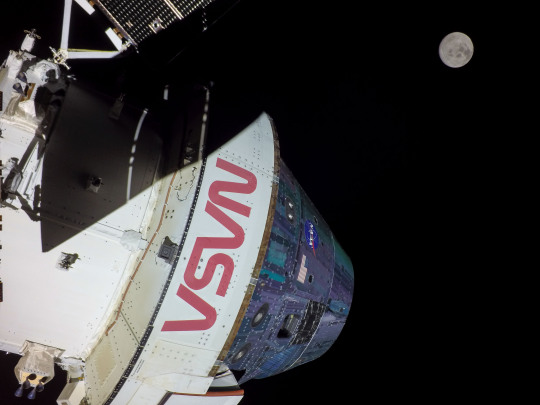
1. Space communication networks helped the Artemis I mission on its historic journey to the Moon. From the launch pad to the Moon and back, the Near Space Network and Deep Space Network worked hand-in-hand to seamlessly support Artemis I. These networks let mission controllers send commands up to the spacecraft and receive important spacecraft health data, as well as incredible images of the Moon and Earth.
The Pathfinder Technology Demonstration 3 spacecraft with hosted TeraByte InfraRed Delivery (TBIRD) payload communicating with laser links down to Earth. Credit: NASA/Ames Research Center
2. Spacecraft can range in size – from the size of a bus to the size of a cereal box. In May 2022, we launched a record-breaking communication system the size of a tissue box. TBIRD showcases the benefits of a laser communications system, which uses infrared light waves rather than radio waves to communicate more data at once. Just like we have upgraded from 3G to 4G to 5G on our phones, we are upgrading its space communications capabilities by implementing laser comms!
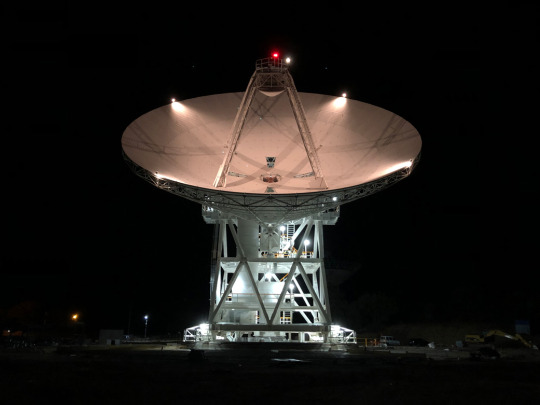
3. The Deep Space Network added a new 34-meter (111-foot) antenna to continue supporting science and exploration missions investigating our solar system and beyond. Deep Space Station 53 went online in February 2022 at our Madrid Deep Space Communications Complex. It is the fourth of six antennas being added to expand the network’s capacity.

4. You’ve probably seen in the news that there are a lot of companies working on space capabilities. The Near Space Network is embracing the aerospace community’s innovative work and seeking out multiple partnerships. In 2022, we met with over 300 companies in hopes of beginning new collaborative efforts and increasing savings.

5. Similar to TBIRD, we're developing laser comms for the International Space Station. The terminal will show the benefits of laser comms while using a new networking technique called High Delay/Disruption Tolerant Networking that routes data four times faster than current systems. This year, engineers tested and proved the capability in a lab.

6. In 2021, we launched the James Webb Space Telescope, a state-of-the-art observatory to take pictures of our universe. This year, the Deep Space Network received the revolutionary first images of our solar system from Webb. The telescope communicates with the network’s massive antennas at three global complexes in Canberra, Australia; Madrid, Spain; and Goldstone, California.
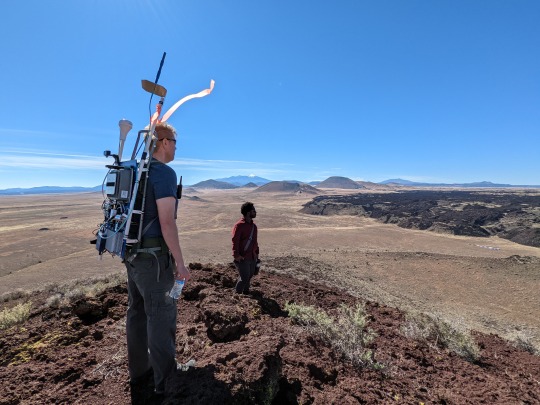
7. Just like we use data services on our phone to communicate, we'll do the same with future rovers and astronauts exploring the Moon. In 2022, the Lunar LTE Studies project, or LunarLiTES, team conducted two weeks of testing in the harsh depths of the Arizona desert, where groundbreaking 4G LTE communications data was captured in an environment similar to the lunar South Pole. We're using this information to determine the best way to use 4G and 5G networking on the Moon.
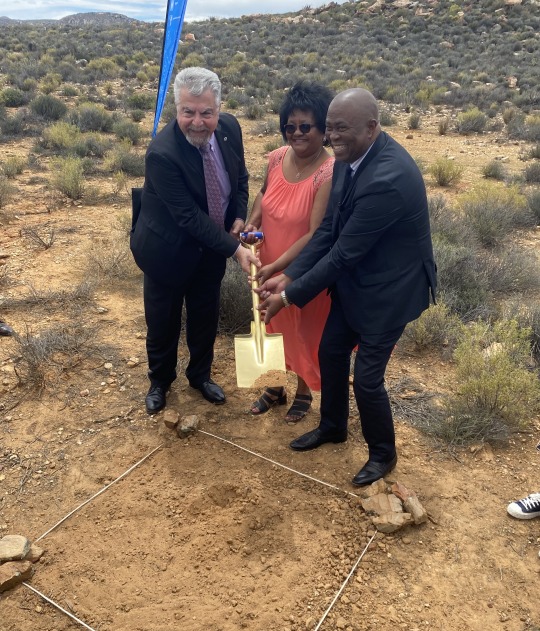
8. A new Near Space Network antenna site was unveiled in Matjiesfontein, South Africa. NASA and the South African Space Agency celebrated a ground-breaking at the site of a new comms antenna that will support future Artemis Moon missions. Three ground stations located strategically across the globe will provide direct-to-Earth communication and navigation capabilities for lunar missions.

9. Quantum science aims to better understand the world around us through the study of extremely small particles. April 14, 2022, marked the first official World Quantum Day celebration, and we participated alongside other federal agencies and the National Quantum Coordination Office. From atomic clocks to optimizing laser communications, quantum science promises to greatly improve our advances in science, exploration, and technology.

10. We intentionally crashed a spacecraft into an asteroid to test technology that could one day be used to defend Earth from asteroids. The Double Asteroid Redirection Test, or DART, mission successfully collided with the asteroid Dimorphos at a rate of 4 miles per second (6.1 kilometers per second), with real-time video enabled by the Deep Space Network. Alongside communications and navigation support, the global network also supports planetary defense by tracking near-Earth objects.
We look forward to many more special moments connecting Earth to space in the coming year.
Make sure to follow us on Tumblr for your regular dose of space!
1K notes
·
View notes
Text
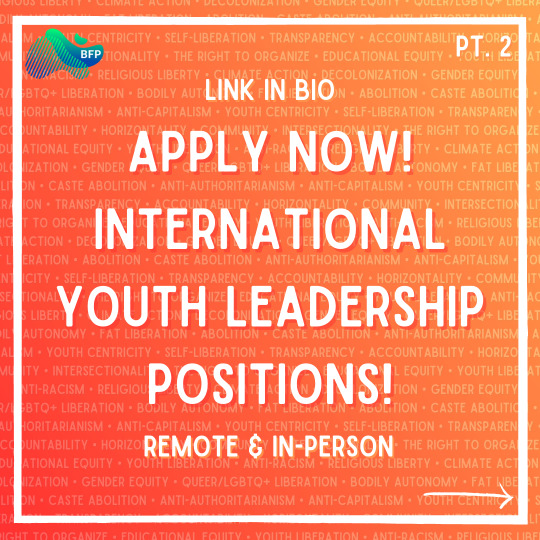
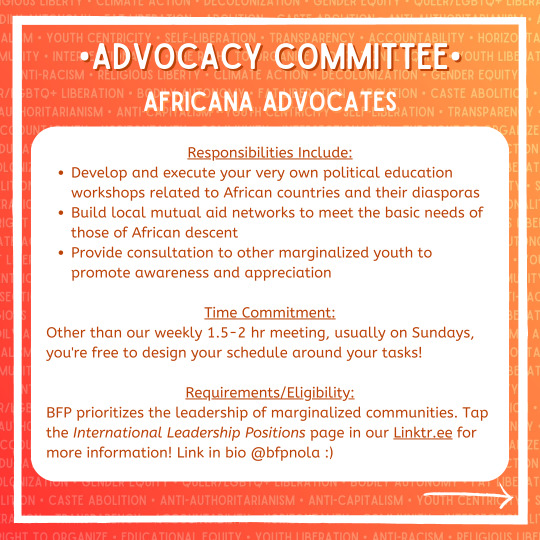
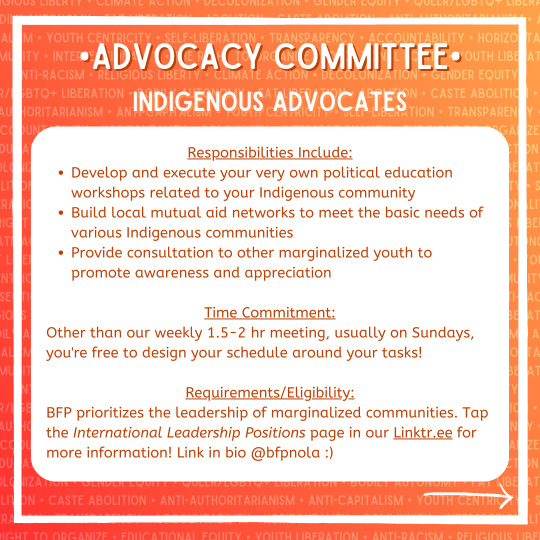
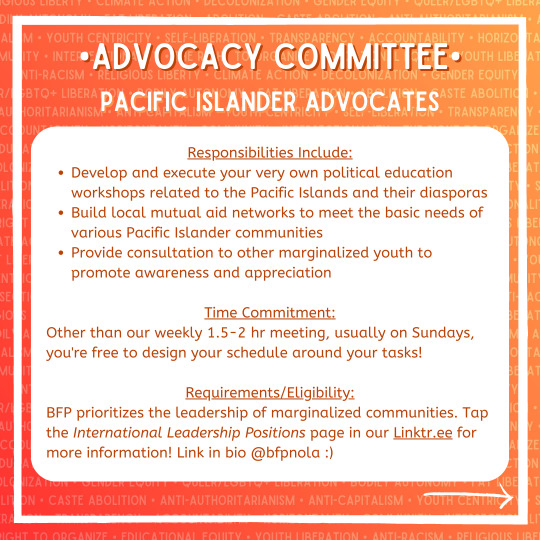


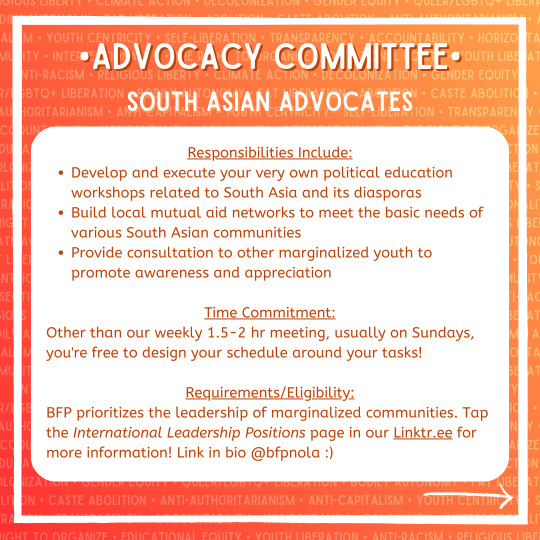
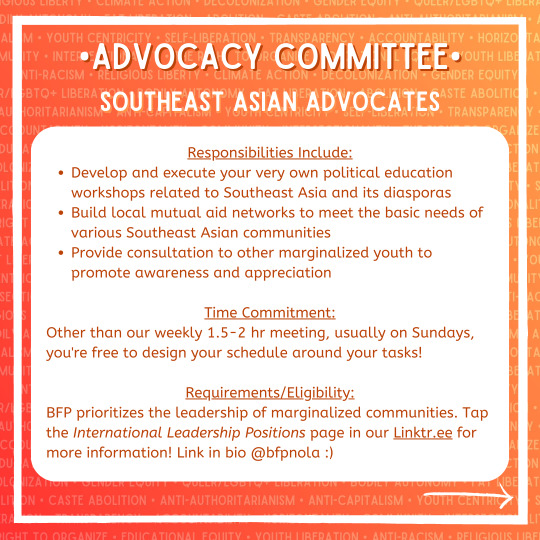

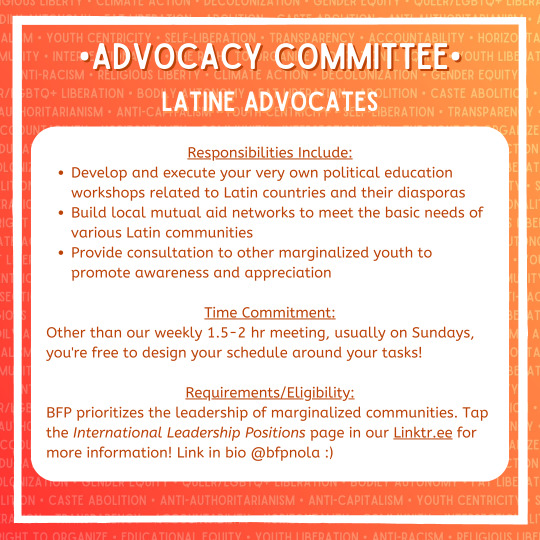
Hey! We're back with part 2! Better Future Program (@bfpnola) is officially looking for youth volunteers between the ages of 14 and 25 for our Advocacy Committee. Don't see a role that fits your identity or beliefs? Don't worry! We've got SO MANY opportunities, we had to split them up across multiple posts! Feel free to check our Linktr.ee for more positions or our "Apply Now!" highlight on Instagram in the coming weeks!
And if you don’t know who we are? Welcome! BFP is Black-, queer-, and woman-owned nonprofit, entirely run by youth! Since 2016, we’ve been accepting volunteers not just from Bulbancha (so-called New Orleans, Louisiana), but WORLDWIDE! Our mission is to globally expand peer-led political education, support, and imagination for marginalized youth!
To fulfill this goal, we offer over 3,000 free resources through our Liberation Library, design and execute mutual aid-based projects, and offer the safe space young activists need to ask questions and grow. If this sounds like something you’d be interested in, check out our International Youth Leadership Positions page in our bio!
Image description below.
[ID: All slides share the same background. There is a repeating list of BFP’s guiding principles and core beliefs in translucent, all-white, capitalized letters. BFP’s guiding principles include youth-centricity, self-liberation, transparency, accountability, horizontality, community, and intersectionality. BFP’s core beliefs include the right to organize, educational equity, youth liberation, anti-racism, religious liberty, disability justice, climate action, decolonization, gender equity, queer/LGBTQ+ liberation, bodily autonomy, fat liberation, abolition, caste abolition, anti-authoritarianism, and anti-capitalism. A burnt orange to amber gradient overlays this list. A bold, white square frames the image with a white arrow pointing right in the bottom right corner.
Slide 1 reads: “LINK IN BIO. APPLY NOW! INTERNATIONAL YOUTH LEADERSHIP POSITIONS! REMOTE & IN-PERSON.” There is a BFP logo in the lefthand corner and the words “Part Two” in the righthand corner, as this is the first of multiple posts showcasing open leadership positions.
Slide 2 reads: "Advocacy Committee: Africana Advocates
Responsibilities Include:
Develop and execute your very own political education workshops related to African countries and their diasporas
Build local mutual aid networks to meet the basic needs of those of African descent
Provide consultation to other marginalized youth to promote awareness and appreciation
Time Commitment:
Other than our weekly 1.5-2 hr meeting, usually on Sundays, you're free to design your schedule around your tasks!
Requirements/Eligibility:
BFP prioritizes the leadership of marginalized communities. Tap the International Leadership Positions page in our Linktr.ee for more information! Link in bio @bfpnola :)" Slide 3 reads: "Advocacy Committee: Indigenous Advocates
Responsibilities Include:
Develop and execute your very own political education workshops related to your Indigenous community
Build local mutual aid networks to meet the basic needs of various Indigenous communities
Provide consultation to other marginalized youth to promote awareness and appreciation
Time Commitment:
Other than our weekly 1.5-2 hr meeting, usually on Sundays, you're free to design your schedule around your tasks!
Requirements/Eligibility:
BFP prioritizes the leadership of marginalized communities. Tap the International Leadership Positions page in our Linktr.ee for more information! Link in bio @bfpnola :)" Slide 4 reads: "Advocacy Committee: Pacific Islander Advocates
Responsibilities Include:
Develop and execute your very own political education workshops related to the Pacific Islands and their diasporas
Build local mutual aid networks to meet the basic needs of various Pacific Islander communities
Provide consultation to other marginalized youth to promote awareness and appreciation
Time Commitment:
Other than our weekly 1.5-2 hr meeting, usually on Sundays, you're free to design your schedule around your tasks!
Requirements/Eligibility:
BFP prioritizes the leadership of marginalized communities. Tap the International Leadership Positions page in our Linktr.ee for more information! Link in bio @bfpnola :)" Slide 5 reads: "Advocacy Committee: Central Asian Advocates
Responsibilities Include:
Develop and execute your very own political education workshops related to Central Asia and its diasporas
Build local mutual aid networks to meet the basic needs of various Central Asian communities
Provide consultation to other marginalized youth to promote awareness and appreciation
Time Commitment:
Other than our weekly 1.5-2 hr meeting, usually on Sundays, you're free to design your schedule around your tasks!
Requirements/Eligibility:
BFP prioritizes the leadership of marginalized communities. Tap the International Leadership Positions page in our Linktr.ee for more information! Link in bio @bfpnola :)" Slide 6 reads: "Advocacy Committee: East Asian Advocates
Responsibilities Include:
Develop and execute your very own political education workshops related to East Asia and its diasporas
Build local mutual aid networks to meet the basic needs of various East Asian communities
Provide consultation to other marginalized youth to promote awareness and appreciation
Time Commitment:
Other than our weekly 1.5-2 hr meeting, usually on Sundays, you're free to design your schedule around your tasks!
Requirements/Eligibility:
BFP prioritizes the leadership of marginalized communities. Tap the International Leadership Positions page in our Linktr.ee for more information! Link in bio @bfpnola :)" Slide 7 reads: "Advocacy Committee: South Asian Advocates
Responsibilities Include:
Develop and execute your very own political education workshops related to South Asia and its diasporas
Build local mutual aid networks to meet the basic needs of various South Asian communities
Provide consultation to other marginalized youth to promote awareness and appreciation
Time Commitment:
Other than our weekly 1.5-2 hr meeting, usually on Sundays, you're free to design your schedule around your tasks!
Requirements/Eligibility:
BFP prioritizes the leadership of marginalized communities. Tap the International Leadership Positions page in our Linktr.ee for more information! Link in bio @bfpnola :)" Slide 8 reads: "Advocacy Committee: Southeast Asian Advocates
Responsibilities Include:
Develop and execute your very own political education workshops related to Southeast Asia and its diasporas
Build local mutual aid networks to meet the basic needs of various Southeast Asian communities
Provide consultation to other marginalized youth to promote awareness and appreciation
Time Commitment:
Other than our weekly 1.5-2 hr meeting, usually on Sundays, you're free to design your schedule around your tasks!
Requirements/Eligibility:
BFP prioritizes the leadership of marginalized communities. Tap the International Leadership Positions page in our Linktr.ee for more information! Link in bio @bfpnola :)" Slide 9 reads: "Advocacy Committee: West Asian Advocates
Responsibilities Include:
Develop and execute your very own political education workshops related to West Asia and its diasporas
Build local mutual aid networks to meet the basic needs of various West Asian communities
Provide consultation to other marginalized youth to promote awareness and appreciation
Time Commitment:
Other than our weekly 1.5-2 hr meeting, usually on Sundays, you're free to design your schedule around your tasks!
Requirements/Eligibility:
BFP prioritizes the leadership of marginalized communities. Tap the International Leadership Positions page in our Linktr.ee for more information! Link in bio @bfpnola :)" Slide 10 reads: "Advocacy Committee: Latine Advocates
Responsibilities Include:
Develop and execute your very own political education workshops related to Latin countries and their diasporas
Build local mutual aid networks to meet the basic needs of various Latin communities
Provide consultation to other marginalized youth to promote awareness and appreciation
Time Commitment:
Other than our weekly 1.5-2 hr meeting, usually on Sundays, you're free to design your schedule around your tasks!
Requirements/Eligibility:
BFP prioritizes the leadership of marginalized communities. Tap the International Leadership Positions page in our Linktr.ee for more information! Link in bio @bfpnola :)" /End ID.]
#reaux speaks#hiring#volunteer#youth activism#african#african diaspora#african american#black power#indigenous#aboriginal#first nations#native american#pacific islander#central asia#west asia#south asia#southeast asia#east asia#latine#latinx#chicano#advocacy#youth#high school#middle school#university#remote#in person#hybrid#abolition
76 notes
·
View notes
Text
The spring meetings of the World Bank and International Monetary Fund have little of the drama of peace negotiations. They are often dominated by technical and technocratic questions concerning the intricacies of international finance. But for the poorest people in the world, the decisions made at these meetings are matters of life and death.
Since the 1990s, the World Bank has facilitated a dramatic decline in extreme poverty globally, from more than 1 in 3 people living in extreme poverty in 1990 to less than 1 in 10 today. But fragile and conflict-affected countries, such as the Democratic Republic of the Congo and Myanmar, have seen the opposite trend: In those places, extreme poverty is growing, and by 2030, they will be home to an estimated 59 percent of all people living in extreme poverty. The convergence of conflict, climate change, and economic shocks has left more than 300 million people dependent on humanitarian aid to survive.
This week’s meetings in Washington offer an opportunity for the World Bank to bridge this gap by revamping its approach to extreme poverty. This will require more imagination than we have historically seen from the development and humanitarian communities. But if the bank can break with traditional development frameworks and improve its reach, scale, and sustainability, it will be able to better support those who need it the most.
In stable states, development economics now has a playbook beyond the Washington Consensus, marked by free market principles and deregulation; international financial institutions now support sustainable and inclusive growth models. But in crisis-affected states, where effective humanitarian action is the first step on the road to development, the World Bank’s policy agenda is much less well developed.
The World Bank itself has recognized this. The bank’s new evolution road map, led by its president, Ajay Banga, recognizes the urgent need to focus on fragility, conflict, and climate change—among other global challenges—to achieve its mission to eradicate poverty on a livable planet. But it still needs a concrete plan.
Historically, the World Bank has relied on robust government partnerships. Yet as the landscape of poverty changes, it will need to adopt a more flexible approach. The bank should expand delivery of its services through nongovernmental partners, which can often better access communities in need. This is particularly important in crisis settings where a government may not be able to reach parts of the country.
For example, my organization, the International Rescue Committee (IRC), has successfully partnered with Gavi, the global organization that seeks to improve access to vaccines, alongside African-led civil society groups in Ethiopia, Somalia, South Sudan, and Sudan. As of February, our partnership has administered more than 1 million doses of lifesaving vaccines to children. Prior to the program, the IRC could access only 16 percent of targeted communities in the Horn of Africa. Now, we are able to reach 77 percent of those areas.
The World Bank also needs a plan to scale up its operations. This requires not just building up capacity but also reducing strains on national systems such as hospital networks, which are often stretched thin during a crisis. Humanitarian organizations such as the IRC have had success reducing acute malnutrition among children by partnering with community health workers to diagnose cases and administer treatment instead of adding to the caseload of hospitals.
It will be crucial for the bank to ensure that its programs can sustain any progress they make. This will require real, not rhetorical, localization: shifting power to local responders and building trust with them so that they can lead and deliver in aid efforts. One example of how localization can ensure that development efforts support a community’s long-term interests is the Building Resilient Communities in Somalia consortium. This program has collaborated with more than 450 communities over the past decade, and its work has been critical to avoiding famine.
Finally, the World Bank should launch a new model for its International Development Association (IDA), one of the largest sources of development finance for the world’s poorest countries. As the World Bank leadership and donors negotiate IDA replenishment this year, they should refine its finance mechanisms to be more responsive to countries’ risk, vulnerability, and accessibility to other sources of finance. For example, the IDA Crisis Response Window—which provides countries with additional resources to respond to climate, health, and economic shocks—could include better criteria to assess how fragility, conflict, and violence can compound these shocks.
More overall funding will be key to these efforts. In 2021, the last time the bank negotiated a financing package for the IDA, development partners agreed on a $93 billion package to support sustainable development in the world’s poorest countries. This year, donors should make even more ambitious pledging contributions that will put the IDA on track for tripling its size by 2030. Expanding nongovernmental partnerships will also help the bank improve disbursal and delivery of IDA funds.
The 1990s and 2000s saw one of the world’s great development success stories as hundreds of millions of people escaped extreme poverty. While the development and humanitarian communities agree on where the next success story needs to take place, that feat will not be built with the tools of the past. Luckily, we’ve already seen how humanitarian actors can drive scale, reach, and sustainability even in some of the most complex places in the world. That should be a guide for the World Bank as it seeks to chart its path for the future.
9 notes
·
View notes
Note
what kind of hours do zoo workers have? how often do they get to reintroduce animals to the wild? do they get to work with international zoos and nature reserves? do they have to work with people a lot? how do they choose what plants go into the enclosures of animals that live in drastically different environments?
There are many different zoo workers including animal care specialists, veterinarians, guest guides, and support staff such as custodians and staff for the gift shops, food services, and ticket intake. And those are just the employees that work on site on a standard day, not including administrative work! In terms of animal care specialists, the standard working day is 8 hours but it can vary. Animal care specialists are very busy! A single animal care specialist will often be responsible for entire areas. For example, instead of being just a gorilla caretaker, one would be primate specialist for the African rainforest area which would have them dividing their time between the gorillas, mandrills, and colobus monkeys. On top of this, they will often assist in other departments as needed due to the unpredictable nature of zoo work. So standard full time hours, but early mornings would be common and some would be on call while off duty, especially vets.
Introducing animals to the wild is a long and slow process that necessitates collaboration between many people and organizations. The Calgary Zoo is also the Wilder Institute, the latter referring to the conservation and international affairs aspect of the institution. The Wilder Institute and organizations like it in other zoos do a lot of work involving the communities local to where their animals are indigenous to, to help protect these species in the wild. The Wilder Institute's community conservation project works to help develop symbiotic relationships between people and wildlife internationally to support long term sustainability. While the majority of animals in zoos cannot be released, when there is an animal that is determind to be able to thrive in the wild the institute will collaborate with communities and organizations local to the animals native region to set it up for the most successful reintroduction policy. So animal releases are not very frequent, but when they are done there is a lot of work done to ensure they are done right. Because the Calgary Zoo is in Canada, they mostly do wild release with species native to the area. They work with local wildlife rehab centers to help raise rescued infants (one of the endangered owls at the Calgary Zoo's Canadian Wilds exhibit is a prolific foster mother for chicks) and will house unreleasable animals such as nuisance bears to prevent them from being euthanized. We tend to think of zoos and sanctuaries as very different, but their work overlaps.
Every (credible) zoo works with many other zoos and nature reserves, acting as one branch of a series of massive conservation programs and initiatives. The Wilder Institute collaborates with a wide network of international bodies, and doing so is often a requirement for accreditation. Zoos as a whole are sort of a living Svalbard seed vault-- the species survival plan matches animals across zoos to find the best genetic and personality matches to allow animals to breed in captivity to create a population safety net for the species. This means that even if an animal goes extinct in the wild, there will be a diverse and healthy population in captivity that could potentially repopulate their native area. This is why I am such a big supporter of zoos! They do so much to prevent extinction on a global scale.
Working with people is a MASSIVE part of zoo work. Zoos have tons of employees and volunteers whose main jobs are answering questions and educating the public. The most important animal in sucessful conservation is humans, because we have the power to mobilize and save other species together. As such, zoos work with guests of all ages to raise awareness, foster appreciation and passion for wildlife, and raise money for their work and projects.
This is a great question which boils down to the basics: what does the species use the plants around it for? Obviously if you're furnishing an outdoor enclosure in Calgary the plants of the African rain forests aren't going to thrive. Additionally, since species are staying in the same areas, if they are hard on the plants they aren't going to grow back as well. As such, native flora that is sturdy and hearty works well, or fake trees that are specifically made to be climbed on can be a good substitute. Keepers may even put greens and foliage on wood structures to mimic tree foraging. Most plants are fair game as long as they are safe to ingest and add something to the habitat, meaning that once the practical concerns are met (safety, sturdiness, hardiness) aesthetic choices can be made.
Hope this answers all your questions! I took my time to make sure I was thorough.
18 notes
·
View notes
Text

Promoting Financial Resilience: The GBE Collective Strategy
In today's ever-evolving global economy, financial resilience is critical for the success of businesses, especially those that are black-owned. The challenges that entrepreneurs face in growing their businesses are multifaceted, from securing investments to gaining visibility in crowded markets. However, the GBE Collective offers a promising solution to these challenges, not only by connecting entrepreneurs with valuable networks but also by fostering financial growth within the black community.
GBE Collective is a global business network aimed at empowering black entrepreneurs by bridging the gap between individuals of African heritage in the diaspora and their business counterparts across Africa, the Americas, the UK, Brazil, and the Caribbean. By fostering strong business partnerships, promoting job creation, and retaining financial resources within the community, GBE Collective is transforming the way black-owned businesses operate and thrive.
Empowering Black-Owned Businesses for Long-Term Success
One of the core missions of the GBE Collective is to empower black-owned businesses, enabling them to become sustainable and successful in their respective markets. This empowerment comes from providing businesses with valuable resources, connections, and tools to succeed in a competitive environment.
Through GBE Collective, entrepreneurs gain access to an expansive network of businesses, potential investors, and partners. These connections help strengthen the foundation of black-owned enterprises, making it easier to navigate the complexities of international trade, expand into new markets, and secure much-needed investments. Additionally, by providing mentorship, resources, and a platform for networking, GBE Collective ensures that black businesses have the support they need to scale their operations successfully.
Promoting Trade and Expanding Market Reach
In the Caribbean and across the African diaspora, many businesses face the challenge of entering new markets. Expanding internationally requires more than just a product or service – it demands a robust network, insider knowledge of the market, and, often, a deep understanding of logistics and trade practices.
GBE Collective bridges this gap by facilitating connections between exporters and importers across Africa, the Caribbean, and the broader diaspora. This means businesses can access new markets with ease, explore fresh business prospects, and benefit from a steady stream of international trade opportunities.
As businesses gain access to broader markets, they are able to expand their reach, develop new partnerships, and diversify their customer base. This fosters economic growth not only within the black community but also across global economies as more African and Caribbean products make their way to international markets.
Addressing the Challenges of Limited Networking and Visibility
One of the most significant challenges black-owned businesses face is the lack of visibility and exposure. Many entrepreneurs find themselves in a crowded marketplace, with limited means to promote their products, services, and events. This lack of visibility can significantly impact a business's ability to gain traction and attract customers.
GBE Collective helps address this issue by offering businesses a platform where they can promote their services and events to a global audience. Through the network, entrepreneurs can advertise their products, connect with like-minded individuals, and showcase their businesses on a broader scale. With access to such a platform, businesses are not just exposed to a limited local market but instead gain international visibility, giving them a competitive edge.
By empowering businesses with promotional tools, GBE Collective ensures that entrepreneurs can expand their reach, build their brand, and cultivate a strong customer base both locally and internationally.
Supporting Startups and SMEs
For startups and small-to-medium enterprises (SMEs), the journey to success can often feel like an uphill battle. Securing funding, accessing resources, and scaling the business can seem nearly impossible without proper guidance and support. GBE Collective addresses these challenges by offering vital resources and services tailored to the unique needs of these businesses.
Startups and SMEs benefit from being part of a community that understands their struggles and provides the necessary tools to overcome them. GBE Collective organizes valuable networking events, workshops, and mentoring opportunities to help businesses build relationships with investors and potential clients. This support allows startups to find the right partners, access resources, and gain the confidence needed to scale their operations.
Overcoming Barriers to Strategic Partnerships
Strategic partnerships can play a pivotal role in the growth of a business. However, finding the right partners and establishing mutually beneficial relationships is often challenging. GBE Collective helps businesses overcome this barrier by fostering an environment where collaboration and partnerships can thrive.
Through the GBE network, businesses can connect with potential partners across various sectors, from suppliers to investors to corporate entities. These partnerships can lead to joint ventures, investments, and collaboration opportunities that drive growth and open doors to new avenues of success.
Championing Youth Education through Millionaires Academy
Financial resilience is not only about business growth but also about fostering the right mindset for success. GBE Collective places a strong emphasis on education, particularly through the Millionaires Academy. The academy offers financial literacy courses that equip individuals with the knowledge they need to make sound financial decisions and build wealth.
By focusing on youth education, GBE Collective helps the next generation of entrepreneurs develop a positive mindset and acquire the skills needed for long-term financial success. These courses cover various aspects of financial management, from budgeting and saving to investing and wealth creation.
Advancing Intra-African Economic Development
Intra-African economic development is another critical goal of GBE Collective. By connecting African entrepreneurs with corporate and industrial entities, the organization is working to foster intra-continental trade and promote economic growth within the African continent. The collective encourages collaboration between businesses from Africa, the Caribbean, and the diaspora, with the goal of creating sustainable and transformative partnerships that drive positive economic change.
Joining GBE Collective: A Pathway to Success
Becoming a member of the GBE Collective means gaining access to an exclusive network of professionals, entrepreneurs, and business owners who share the same vision for success. Whether you're looking to expand your business into new markets, secure investors, or find the right strategic partners, GBE Collective offers the support and resources necessary to help you achieve your goals.
The collective’s community guidelines encourage collaboration, transparency, and responsible networking, ensuring a respectful and productive environment for all members. By sharing posts aligned with the collective's mission, supporting fellow members, and participating in networking events, businesses can form valuable connections that contribute to their growth and success.
Conclusion
The GBE Collective is a transformative movement that plays a vital role in promoting financial resilience within the black community. By empowering black-owned businesses, fostering strategic partnerships, and advancing economic growth through intra-continental trade, the collective is helping businesses overcome common barriers to success. Through the support of resources like the Millionaires Academy and access to a global network, GBE Collective offers entrepreneurs the tools they need to navigate challenges and thrive.
If you're ready to take your business to the next level, consider joining the GBE Collective and becoming part of a powerful network dedicated to financial resilience and success. Together, we can build a thriving economic future for black-owned businesses across the globe.
0 notes
Text
How Recruitment Agencies are Facilitating Job Placement in Africa for Indians
The growth of Africa has been promising, with many countries experiencing rapid economic development and increased investment opportunities. As businesses expand and new industries emerge, the demand for skilled professionals has never been higher. African employers are increasingly looking beyond their borders to find the right talent to drive their companies forward. This is where the top IT recruitment companies in India come into play, bridging the gap between Indian job seekers and African employers, ensuring a seamless and efficient hiring process.
This blog will discuss the benefits of using recruitment agencies to secure employment opportunities in Africa for Indians, highlighting the advantages of working with professionals who understand the unique needs and requirements of both job seekers and employers in these regions.
The Role of Recruitment Agencies
Recruitment agencies play a pivotal role in connecting Indian professionals with jobs in Ghana for Indians. These agencies act as intermediaries, understanding the needs of both employers and job seekers to create a perfect match. They offer a range of services, from sourcing and screening candidates to facilitating interviews and handling the logistics of international placements. This comprehensive approach ensures that African employers receive well-vetted candidates who are ready to contribute from day one.
Specialising in international placements, these agencies possess the expertise required to navigate the complexities of cross-border recruitment. They are well-versed in the cultural nuances, legal requirements, and market dynamics of both regions, making the hiring process smoother and more efficient.
By leveraging their extensive networks and industry knowledge, construction recruitment agencies can provide African companies with access to a diverse talent pool, bringing in professionals who can drive innovation and growth. This collaboration not only benefits the companies but also opens up new career avenues for Indian job seekers, creating a win-win situation for all parties involved.
Challenges and Solutions
Despite the many benefits, the process of international job placement is not without its challenges. Indian job seekers often face hurdles such as cultural differences, language barriers, and visa regulations when considering opportunities in Africa. These challenges can be daunting, but recruitment agencies are well equipped to help candidates navigate them. By providing cultural training and language support, agencies ensure that candidates are well-prepared to adapt to their new environments. This preparation not only helps job seekers feel more confident but also enables them to integrate more smoothly into their new workplaces.
How Recruitment Agencies Help African Companies
For African employers, finding the right talent can also be a complex task. The local talent pool may not always meet the specific needs of their businesses, leading them to look internationally. Recruitment agencies like Ross Warner HR Solutions address this issue by leveraging their extensive networks to source candidates who possess the required skills and experience. They also handle the intricacies of the hiring process, from verifying qualifications to managing the legal aspects of international employment. This comprehensive support allows employers to focus on their core business activities while trusting that their recruitment needs are being expertly managed.
By overcoming these challenges, recruitment agencies create a win-win situation for both job seekers and employers. They facilitate a smoother transition for candidates moving to Africa and ensure that companies have access to the talent they need to thrive. This collaborative approach not only enhances the efficiency of the hiring process but also contributes to the overall success and growth of businesses in Africa. Through their dedicated efforts, recruitment agencies play a crucial role in bridging the gap between continents and fostering global career opportunities.

Conclusion
Recruitment agencies play a crucial role in bridging the gap between Indian job seekers and African employers. They offer a comprehensive range of services that streamline the hiring process, from initial consultations and assessments to handling the logistics of international placements. By leveraging their expertise and extensive networks, agencies like Ross Warner HR Solutions ensure that both job seekers and employers find the perfect match, leading to successful and mutually beneficial placements.
0 notes
Text

Congo ECTN Certificate: Contribution to Africa's Logistics Blockchain
Africa is taking on a more central role in international supply chains, driven by increasing trade volumes and the digitalization of its logistics infrastructure. In this context, the Congo ECTN Certificate (Electronic Cargo Tracking Note) stands out as a critical digital tool within Africa's logistics ecosystem. With its potential to integrate with blockchain technology, the ECTN Certificate has become a cornerstone for enhancing transparency across the continent's logistics network. This article explores the Congo ECTN Certificate's contribution to Africa's logistics blockchain.
1. Enhancing Transparency and Traceability in Logistics
Blockchain technology is one of the most effective methods for improving transparency and traceability in logistics. The Congo ECTN Certificate complements this by digitally recording shipment details, making it compatible with blockchain structures.
How Does It Help?
Provides reliable data on the status and movement of cargo at every stage.
Facilitates digital verification of documents, increasing transparency throughout the supply chain.
Outcome:
Reduces uncertainties in freight transportation and ensures more secure operations.
2. Preventing Fraud and Counterfeiting
Fraudulent documents and counterfeiting are significant issues in Africa's logistics sector. The Congo ECTN Certificate mitigates these problems through its digital verification and tracking capabilities.
How Does It Help?
The digital structure of the certificate makes document manipulation challenging.
Blockchain integration creates immutable records at every stage of the process.
Outcome:
Reduces fraud risks and establishes a trustworthy trade environment.
3. Reducing Processing Times and Improving Efficiency
When combined with the speed of blockchain technology, the Congo ECTN Certificate streamlines logistics processes and enhances efficiency.
How Does It Help?
Digital storage of certificates speeds up customs and logistics operations.
Instant data sharing among stakeholders reduces waiting times.
Outcome:
Saves time in logistics operations and reduces costs.
4. Alignment with the African Continental Free Trade Area (AfCFTA)
The African Continental Free Trade Area (AfCFTA) provides a platform to facilitate and increase trade across the continent. The Congo ECTN Certificate optimizes trade flows in alignment with AfCFTA's digitalization goals.
How Does It Help?
Encourages digital integration among AfCFTA member states to boost trade volume.
Blockchain-based data sharing simplifies trade processes across the continent.
Outcome:
Accelerates trade integration and streamlines logistics operations.
5. Contribution to Reducing Carbon Footprints
Blockchain technology and digital documentation reduce the dependency on traditional paperwork, lowering the environmental impact of the logistics sector. The Congo ECTN Certificate supports these sustainability goals.
How Does It Help?
Digital certificates eliminate the need for physical documents, reducing paper consumption.
More efficient logistics operations lower fuel consumption and carbon emissions.
Outcome:
Contributes to the development of environmentally friendly logistics systems.
6. Ensuring Data Security and Sharing in Logistics
Another advantage of blockchain technology is the secure storage and sharing of data. The Congo ECTN Certificate enhances the confidentiality and security of logistics data.
How Does It Help?
Certificate information is stored securely on a platform accessible only to authorized stakeholders.
Data sharing minimizes errors in logistics processes.
Outcome:
Makes logistics operations safer and strengthens collaboration among stakeholders.
The Future of Africa's Logistics with the Congo ECTN Certificate
The Congo ECTN Certificate is accelerating the digital transformation of Africa’s logistics sector and holds the potential to integrate with blockchain technology. With advantages such as digitalization, transparency, security, and sustainability, this certificate plays a significant role in modernizing the continent's logistics infrastructure.
0 notes
Text

Apply TotalEnergies Internships Programme 2025 TotalEnergies Internships Programme 2025 Are you a recent graduate ready to kick-start your career within a globally renowned energy company? TotalEnergies Marketing South Africa offers a unique 12-month Graduate Internship Programme in 2025, located in the heart of Johannesburg. This immersive opportunity is ideal for South African graduates across multiple disciplines, from Engineering and Commerce to Environmental Science and Humanities, empowering them with hands-on industry exposure and mentorship by leading professionals. - Location: Johannesburg, South Africa - Domain: Operations | Contract Type: Internship | - Duration: 12 Months TotalEnergies, a global leader in the energy sector, is committed to fostering a sustainable future and nurturing the next generation of industry leaders. The TotalEnergies Graduate Internship Programme 2025 is designed to offer recent graduates practical work experience across various departments in alignment with their academic backgrounds. This programme focuses on providing a strong foundation in both technical and soft skills to excel in the energy sector. Graduates gain comprehensive insights into their respective fields, contributing directly to TotalEnergies’ South African operations and learning under the guidance of experienced professionals. TotalEnergies’ internship programme offers a rewarding platform for graduates, equipping them with real-world experience in a competitive industry. As a part of a high-performing team, you will have the chance to develop specialized skills, build a professional network, and contribute to an organization at the forefront of the global energy transformation. Who Should Apply? This programme is open to South African graduates with a Bachelor’s or Honours Degree in the following fields: - Engineering & Built Environment: Chemical, Electrical, Industrial, Mechanical, Metallurgical, and Process Engineering - Commerce: Finance, Accounting, Financial Management, Economics, Supply Chain, Logistics, and Transport Management - Science & Technology: Applied Chemistry, Statistical Sciences, Mathematics, Computer Science, Data Analytics, Environmental Science, and Geography - Humanities: Social Work, Human Resources, and Industrial Psychology - Law: Bachelor of Laws (LLB) - Governance: Compliance, Marketing Management, and Governance Key Programme Highlights and Activities Interns joining the TotalEnergies Graduate Internship Programme in Johannesburg will experience a supportive, dynamic, and challenging work environment. Each intern will: - Collaborate with seasoned professionals and engage in day-to-day tasks relevant to their department. - Gain valuable insights into operations, technology, and sustainability efforts within a leading energy firm. - Enhance skills applicable to diverse industries, from commerce and engineering to environmental sustainability. - Contribute to strategic projects that align with TotalEnergies’ vision and corporate social responsibility. Eligibility Requirements To qualify, applicants must: - Be South African citizens with a completed Bachelor’s or Honours Degree. - Possess a recently updated CV, valid ID copy, qualification certificates, and academic records. - Have less than one year of work experience. Required Documents Candidates are required to submit the following: - Updated CV: Showcasing academic background and skills. - ID Copy: Proof of South African citizenship. - Qualification Documents: Verified copies of degree certificates. - Academic Record: An official transcript of grades. SEE ALSO: Ampath Laboratories Lab Assistants Learnerships 2024 How to Apply? Click Here to Apply Read the full article
0 notes
Text
Trailer Manufacturers in South Africa: Meeting the Diverse Needs of a Growing Market
South Africa's caravan manufacturing industry supports a wide range of industries, including agriculture, logistics, construction, and personal recreation. With an increased demand for long-lasting, dependable, and versatile trailers, trailer manufacturers in South Africa have carved out a niche by combining quality engineering with innovative solutions tailored to the region's specific requirements. This article delves into the various types of trailers, the standards maintained by trailer manufacturers in South Africa, and the impact of these trailers on key South African industries.
A Range of Trailers for Varied Needs Trailer manufacturers in South Africa design and manufacture trailers that serve a wide range of applications. Trailers are essential for transporting agricultural equipment, livestock, and harvested crops. Leading trailer manufacturers in South Africa ensure that their trailers meet the rigorous demands of rural terrains and long-distance hauls, using materials that can withstand the harsh African roads.
Trailer manufacturers in South Africa specialise in high-capacity, heavy-duty trailers that are designed for efficiency and performance. Commercial trailers play an important role in South Africa's robust logistics network, facilitating the movement of goods over long distances. Flatbeds, dry vans, and tankers are among the trailers available, each designed to meet industry-specific specifications.
Furthermore, trailer manufacturers in South Africa are developing specialised trailers for construction equipment and materials, which are critical to the industry's ongoing infrastructure projects. Furthermore, trailer manufacturers in South Africa cater to the recreational market by producing compact trailers suitable for outdoor activities. The recreational segment, which ranges from camper trailers for weekend getaways to off-road trailers for the adventurous, continues to grow as domestic travel becomes more popular.
Quality Standards & Engineering Excellence Every reputable trailer manufacturers in South Africa prioritises quality and durability. They follow strict standards, often exceeding local regulations, to ensure that every caravan is roadworthy and safe for both the cargo and the driver. Most trailer manufacturers in South Africa use high-quality materials like steel and aluminium for the frames, as well as advanced welding techniques and corrosion-resistant coatings, to increase durability.
Several trailer manufacturers in South Africa focus on integrating advanced technologies, such as hydraulic braking systems and LED lighting, to improve road safety and visibility. They frequently work with global suppliers to incorporate high-quality imported components, bringing together local craftsmanship and international engineering standards.
Supporting the South African Economy Trailer manufacturers in South Africa contribute more than just essential equipment. These manufacturers also play an important role in the national economy, creating jobs, supporting local businesses, and boosting South Africa's export capabilities. Many South African caravan manufacturers actively participate in skills development programmes, training their employees in modern manufacturing techniques and ensuring high levels of craftsmanship.
Conclusion To summarise, trailer manufacturers in South Africa have established themselves as valuable contributors to a variety of industries by combining quality, safety, and innovation to create trailers suitable for a wide range of applications. Caravan manufacturers in South Africa have extensive expertise in fields ranging from agriculture and logistics to recreation, which is critical to the country's infrastructure, economic growth, and sustainability. As these manufacturers continue to innovate and adapt, South Africa will remain a leader in caravan manufacturing on the African continent.
0 notes
Text
Russia isn’t fighting Ukraine alone. Alongside its soldiers are African conscripts, supported by Iranian drones and partly funded by stolen gold and diamonds. They may soon be joined by “lethal support” from China, according to U.S. officials.
For these vital contributions, Russian President Vladimir Putin can thank his fellow autocrats. And he’s returning the favor: Despite the invasion’s heavy toll on Russia, he still sends resources to other embattled dictators. Autocrats, like democrats, are finding that war offers them new opportunities to cooperate. And dictators’ inherent interest in staying in power means that their collaboration will continue regardless of whether Ukraine prevails.
These networks weren’t created overnight but reflect prolonged efforts by Russia, China, and likeminded regimes to make the world safe for autocracy—particularly following the Western response to Putin’s first Ukraine invasion in 2014. Their activities include neutering international civil society, spreading disinformation, and exporting surveillance technology. Today’s war in Ukraine illustrates the power of these networks—coalitions not of the willing but the wanton—to not only sustain authoritarianism where it already exists, but to export it by force.
These networks have impeded Western attempts to isolate the Kremlin and starve its war machine. Within days of the invasion, Western diplomats made Russia the most sanctioned country in the world. At first, these penalties appeared to be working: They erased Russia’s post-Soviet development gains, and more than a thousand international companies left the country. But Russia built new ties. For instance, as oil exports to the West fell in 2022, purchases from China and India—countries that did not condemn the invasion—made up the difference, contributing to Russia’s record $227 billion trade surplus. Russia used these funds to pay for the war and blunt its economic consequences for ordinary Russians. On the diplomatic front, Russia has been heavily courting African nations.
Belarus’s Aleksandr Lukashenko has aided Putin the most, hosting Russia’s troops and allowing missile launches from Belarusian territory, but these authoritarian networks stretch much farther than neighboring countries. Take, for example, Sudan. When sanctions sent the value of Russian rubles plunging to record lows, the Kremlin turned to its gold reserves to prop it up. In order to fill those reserves—which had tripled in size since Russia’s 2014 invasion—the Russians have been colluding with Sudan’s military dictatorship to smuggle billions of dollars’ worth of gold out of the country. One shipment, hidden under boxes of cookies, was scheduled to depart Khartoum just days after the invasion.
Russia’s Sudanese gold-mining front is called Meroe Gold. It began operations in 2017, weeks after the country’s then-dictator, Omar al-Bashir, asked Putin for help staying in power. Russia dispatched advisors from the Wagner Group, the ruthless Kremlin-linked mercenary group fighting in Ukraine and around the world. Wagner’s advice lived up to its reputation: During Sudan’s 2018 protests, its personnel told al-Bashir to execute individual demonstrators to set an example. After pro-democracy protests ousted al-Bashir in 2019, Wagner cozied up to Sudan’s military, which toppled the country’s nascent democratic government in 2021. In return, Wagner was given free rein of the mining industry. It has eliminated the competition by massacring dozens of miners near Sudan’s border with the Central African Republic (CAR).
The Central African story is depressingly similar to Sudan’s. Besieged by rebels, in 2018 the country’s president appealed to the Kremlin for arms and to Wagner to train his troops. Unlike in Sudan, in 2020 Wagner began to fight the insurgents directly. As payment, the government ceded control of the diamond industry. Wagner forces artisanal miners to sell only to its shell company, Diamville, through intimidation and violence. The blood diamonds are then smuggled out of the country and sold unofficially on Facebook and Instagram and officially through dealers in the West in order to fund Wagner’s operations.
In addition to money, Wagner—facing heavy losses in Ukraine—is drawing manpower from the CAR and its neighbors. It has recruited imprisoned murderers, rapists, and even rebels convicted of killing CAR soldiers (Wagner’s ostensible allies), promising freedom and cash to anyone willing to fight in Ukraine. In March 2022, Libyan National Army commander Khalifa Haftar agreed to send mercenaries to fight for Russia, and Syrians are reportedly joining them.
While deployed in Africa, Wagner personnel have behaved with impunity: pillaging, raping, and trafficking women. Nevertheless, when asked, many Central Africans back Moscow or credit Wagner for bringing peace. Sixteen African nations, including the CAR and Sudan, abstained or voted against the February 2023 United Nations resolution calling on Russia to exit Ukraine. This is a testament not only to public opinion (or indifference) about Ukraine’s plight, but also to the appeal of what the Kremlin offers Africa’s autocrats. Leaders of poor but resource-rich countries are effectively giving Wagner bits of their sovereignty—and ignoring any resulting human rights violations—as payment for keeping them in power. And more are interested: Ghana’s president alleged that Burkina Faso’s leadership requested Wagner’s help, offering a mine in return.
Not every case of support for Russia’s war machine is so brazen or features a private military-mafia straight from a James Bond movie. Take the United Arab Emirates (UAE). Its willingness to look past shady financial transactions has allowed billions of dollars to flow to the Kremlin, as much of Sudan’s gold and the CAR’s diamonds are sold illicitly there. The UAE also bills itself as a haven for sanctioned Russian oligarchs, making it easy for them to come, buy Emirati citizenship, and park their yachts, planes, and ill-gotten gains. Turkey has become an entrepôt for European businesses seeking to continue trading with Russia. Chinese defense companies are supplying the Kremlin with crucial navigation, radio-jamming, and fighter jet components.
Armaments are also a growing part of Russia’s dealings with Iran, another embattled, sanctioned autocracy. Iranian drones have played a “central role” in attacks on Ukrainian civilians. And more are coming: The two countries are planning to build a factory in Russia to produce at least 6,000 of them. Iran, for its part, should receive around 24 Russian fighter jets by March. It also turned to Russia for counsel on defusing the protests sparked by Mahsa Amini’s death, so the Kremlin reportedly dispatched advisors. These actions are leading Moscow and Tehran toward a “full-fledged defense partnership.”
Not all autocrats are moving toward Putin. In principle, Venezuela’s regime consistently supports Russian imperialism: It took Russia’s side against Georgia in 2008, recognized Crimea as Russian, and blamed the West for the Ukraine invasion. And Putin helped Venezuela’s dictator to sell oil as democracies recognized the opposition government-in-exile and imposed crushing sanctions. But now, in practice, relations between Venezuela and the West are normalizing: Maduro wants to sell oil, and the West wants to stop buying it from Russia.
Venezuela shows that these coalitions of the wanton are as easy to make as they are to break, for they are held together only by self-interest. Nevertheless, these ties are bound to proliferate as autocrats turn to each other amid crisis. The Kremlin in particular views these networks as fundamental to maintaining power at home and waging a perceived existential struggle against the West. In other words, autocrats already see their struggles against democracy—whether in Iran, Sudan, or Ukraine—as interconnected and act accordingly. Democracies must learn to do the same.
8 notes
·
View notes
Text
Creating Opportunities For The Future Generation Of Africa: The International Support Offered By The JAN Scholarship Program

Together with its African cohorts, it is worth noting that the Joint Africa Network (JAN) Scholarship Program has the potential to revolutionize educational perspectives for Africa’s most talented individuals. JAN’s focus on the education-centered approach and leadership self-efficacy amongst their people is inevitable for a generation of African leaders who can and will make a difference in the continent of Africa.
To begin with, the JAN Scholarship Program holds the view that for an individual and the community to be developed, it is imperative that the individual goes through some higher education level. Unfortunately finances are a major hindrance and obstacle to many thousands of gifted Africa students. JAN comes to mitigate these disadvantages, providing full and all-inclusive scholarships that pay tuition fees, basic sustenance, accommodations, etc. But the commitment of the program cuts across just financial support.
The JAN Scholarship exposes students to a myriad of networks and skill-building all valuable towards global leadership. More importantly, these resources develop students with relevant knowledge and confidence to study and work in important areas for Africa’s development, including but not limited to medicine, information technology and ecological sciences.
JAN believes that education goes beyond books, it is about building individuals who go back to their societies and effect change. Scholars from JAN matriculate and take ideas/skills which can develop others or become a reality themselves.
These young leaders that JAN invests in are not only individuals who will become the future, but rather part of a bigger picture that will lead to an independent and fully developed Africa. JAN scholarship prospects youth with education together with values that will lead to change in people and the world at large.
#business#entrepreneur#entreprenuership#small business#pr agency#pr firm#startup#public relations#ceos
0 notes
Text

The Role of GBE Collective in Promoting Intra-African Trade
In today's rapidly changing global economy, the need for robust intra-African trade has never been more critical. The GBE Collective is at the forefront of this movement, committed to transforming challenges into opportunities for black-owned businesses across Africa and its diaspora. By facilitating connections and fostering economic growth, GBE Collective is dedicated to bridging gaps and empowering entrepreneurs to thrive.
Who We Are
GBE Collective, which stands for "Bridging Africa to the Diaspora," is a global business network designed to connect individuals of African heritage in the diaspora with business affiliates across Africa, America, the UK, Brazil, and the Caribbean. Our mission is clear: we aim to empower black-owned enterprises, foster job creation, cultivate new business alliances, and retain financial resources within our community.
Our Objectives
Our key objectives are focused on driving economic growth and promoting intra-African trade:
- Empowering Black-Owned Businesses: We strive to create a supportive environment where black-owned businesses can thrive.
- Creating New Business Ventures and Employment Opportunities: By connecting entrepreneurs with resources and networks, we facilitate job creation and the establishment of new ventures.
- Cultivating Strategic Business Partnerships: We prioritize forming beneficial partnerships that can lead to investment and growth opportunities.
Join Us in Our Mission
When you join the GBE Collective, you become part of a transformative initiative aimed at promoting your business and fostering economic growth within our community. Here are some ways to get involved:
- Promote Your Business and Events: Showcase your business to a global audience through our platform.
- Advertise Your Products and Brands: Utilize targeted promotions to gain exposure for your offerings.
- Explore Fresh Business Prospects: Discover new entrepreneurial opportunities within our innovative community.
- Connect Exporters and Importers: Expand your reach by linking with importers and exporters across Africa and the Caribbean.
- Foster Trade and Establish Partnerships: Build lasting business relationships that drive success and economic growth.
- Support Startups, SMEs, and Institutions: Access resources tailored to your needs, whether you’re a startup, SME, or NGO.
- Champion Youth Education through the Millionaires Academy: Engage with our online courses designed to enhance financial knowledge and foster a positive mindset.
The Importance of Intra-African Trade
Intra-African trade is vital for the continent's economic development. It promotes economic resilience, job creation, and innovation while enabling African countries to reduce dependency on external markets. The GBE Collective recognizes the barriers many entrepreneurs face in tapping into these opportunities and is dedicated to breaking down those barriers.
Common Challenges in Growing Your Black-Owned Business
Many entrepreneurs encounter significant hurdles as they strive to elevate their businesses. Here are some common challenges and how GBE Collective addresses them:
1. Lack of Visibility and Promotion: Standing out in a crowded marketplace can be daunting. GBE Collective provides a platform for businesses to gain visibility and connect with a larger audience.
2. Limited Networking Opportunities: Navigating international markets often requires meaningful connections. GBE Collective facilitates networking opportunities that can lead to valuable partnerships and collaborations.
3. Difficulty Accessing New Markets: Breaking into new regions can be complex. Our network provides the insider knowledge and connections needed to access new markets effectively.
4. Insufficient Support for Startups and SMEs: Starting and growing a business requires guidance and resources. GBE Collective offers support systems to help entrepreneurs overcome initial hurdles.
5. Challenges in Securing Strategic Partnerships: Establishing reliable partnerships can drive business growth. GBE Collective helps facilitate these relationships, enhancing collaboration among members.
Transforming Challenges into Opportunities
The GBE Collective is dedicated to transforming challenges into opportunities for its members. By fostering an environment of support and collaboration, we empower entrepreneurs to overcome obstacles and achieve their goals. Here’s how GBE Collective can support your journey:
- Promote Your Business and Events: Utilize our platform to gain visibility and connect with potential customers.
- Advertise Your Products and Brands: Leverage targeted promotions to enhance your market presence and attract the right clientele.
- Explore Fresh Business Prospects: Our community is a hub for innovation, providing resources and connections to discover new opportunities.
- Connect Exporters and Importers: Benefit from our network's ability to connect you with key players in African and Caribbean markets.
- Foster Trade and Establish Partnerships: Engage with other businesses to create lasting relationships that support economic growth.
- Support Startups, SMEs, and Institutions: Access the resources you need to thrive, regardless of your business size or type.
- Champion Youth Education through Millionaires Academy: Enhance your skills and mindset through courses aimed at fostering financial success.
Why Join GBE Collective?
By joining the GBE Collective, you’re not just becoming part of a network—you’re stepping into a powerful community dedicated to your success. The collective empowers members to embrace opportunities, connect with like-minded professionals, and work towards common goals.
Ready to transform your business journey? Connect with us on our social media platforms and become part of the GBE Collective today. Together, we can bridge Africa to the diaspora and create a thriving business community that drives economic growth.
Conclusion
In summary, GBE Collective plays a crucial role in promoting intra-African trade and supporting black-owned businesses in overcoming common challenges. Through our comprehensive network, members gain access to vital resources, visibility, and the opportunity to connect with fellow entrepreneurs. Together, we can create a powerful movement that elevates businesses across Africa and its vibrant diaspora, ensuring success and economic impact for all. Join us today and be a part of this transformative initiative!
0 notes
Text
RoHS Certification: Ensuring Compliance with Environmental Standards

The Restriction of Hazardous Substances (RoHS) certification plays a crucial role in regulating and minimizing the environmental impact of hazardous materials in electronic and electrical equipment. Initially developed within the European Union, RoHS Certification in South Africa is now recognized worldwide, including in South Africa, where businesses are increasingly adopting these standards to meet global market demands, enhance environmental responsibility, and strengthen compliance measures. This blog provides a comprehensive overview of RoHS implementation in South Africa, RoHS services available, and the essential steps involved in a RoHS audit.
RoHS Implementation in South Africa
In South Africa, RoHS implementation has gained significant traction due to the growing awareness around sustainability and environmental preservation, as well as the demand for internationally compliant products. RoHS requirements are especially relevant in sectors such as electronics, manufacturing, and consumer goods. Under RoHS standards, manufacturers, importers, and distributors must ensure that their products do not contain restricted substances like lead, mercury, cadmium, hexavalent chromium, and certain flame retardants (PBB and PBDE) beyond prescribed limits.
South African businesses, particularly those looking to export to the EU and other RoHS-compliant markets, see RoHS as an essential part of their operations. Compliance enables local businesses to mitigate potential regulatory risks, enhance brand reputation, and access international markets with greater ease. Additionally, adhering to RoHS standards promotes sustainability, reduces electronic waste, and fosters a culture of eco-conscious production in South Africa.
Implementing RoHS standards involves understanding local regulations and applying them to company operations, ensuring that supply chains align with these standards, and embedding RoHS requirements into product design and manufacturing processes. Many South African companies have integrated these standards to remain competitive, not only regionally but on a global scale.
RoHS Services in South Africa
RoHS Services in Bahrain is designed to help businesses comply with certification standards by offering a range of services that include compliance consultation, material testing, documentation support, and supply chain verification. A strong network of certification bodies, laboratories, and consultants provides these services to guide organizations through the entire compliance process, making it manageable and effective.
Consultation Services: Experts offer tailored RoHS consultation to companies, guiding them through the regulatory requirements and necessary adjustments in production practices. Consultants analyze each client’s specific needs, including industry requirements, target markets, and product types, ensuring a structured compliance approach.
Material Testing: Accredited laboratories in South Africa conduct in-depth testing of materials and components to verify that they comply with RoHS restrictions on hazardous substances. This process usually involves testing samples of raw materials, components, and finished products to confirm that restricted substances are within allowable limits.
Documentation Support: Compliance with RoHS also entails thorough documentation, including technical files, risk assessments, and conformity declarations. Service providers assist companies in preparing and maintaining the necessary documents, which not only help demonstrate compliance but also provide a robust record for audits.
Supply Chain Audits and Management: A significant aspect of RoHS compliance involves ensuring that suppliers within the supply chain also adhere to these standards. Service providers assist businesses in assessing their supply chain partners, implementing RoHS-compliant procurement processes, and managing supplier conformity through regular audits.
These services support South African businesses in aligning with RoHS directives and maintaining compliance across product lifecycles. Additionally, by engaging with qualified service providers, companies reduce the risk of non-compliance, which could lead to market restrictions, penalties, or product recalls.
RoHS Audit in South Africa
Conducting a RoHS Audit in Bangalore is a fundamental step in the certification process, as it verifies that a company’s products, processes, and supply chains comply with RoHS standards. RoHS audits are carried out by qualified auditors who assess various compliance elements to ensure all requirements are being met.
Pre-Audit Preparation: Companies must begin by reviewing their production processes, supply chains, and existing documentation. This stage involves internal reviews of product designs, materials, and components, ensuring that they meet RoHS standards. Organizations should also establish clear compliance protocols to ease the audit process.
Onsite Audit and Inspection: Auditors perform a detailed inspection of the production facility, focusing on areas where restricted materials might be present or used. This includes testing of product samples, inspection of documentation, and verification of supplier compliance. Auditors also review quality control procedures to confirm that ongoing practices align with RoHS requirements.
Supply Chain Verification: A critical component of RoHS compliance involves verifying that suppliers meet the same standards. The audit includes an evaluation of supplier documentation, raw materials testing, and checks on imported goods to ensure consistency with RoHS regulations.
Reporting and Corrective Actions: After the onsite audit, auditors provide a comprehensive report detailing their findings. If any non-compliance issues are detected, companies receive recommendations for corrective actions. These might involve re-evaluating suppliers, updating documentation, or refining production practices. After completing these actions, companies may undergo a follow-up audit to verify compliance.
Certification and Ongoing Monitoring: Once all aspects of the audit are satisfied, companies receive RoHS certification, validating their adherence to the standard. Regular monitoring is encouraged, as RoHS compliance is a continuous requirement that demands consistent quality control and supply chain management.
Conclusion
RoHS Registration in South Africa businesses involved in manufacturing, importing, or distributing electronic and electrical products. Through dedicated RoHS implementation, effective use of specialized services, and rigorous auditing processes, South African companies are better equipped to meet international environmental standards, enhance their market appeal, and contribute to the reduction of hazardous substances in electronic waste. Compliance not only elevates a company's reputation but also demonstrates a commitment to sustainability and global market compatibility.
With an array of RoHS services and structured audits, South Africa’s industry players have a robust pathway to achieving and maintaining compliance, positioning themselves advantageously in an increasingly environmentally conscious global market.
0 notes
Text
Join the GBE Community: Connecting Africa to the Diaspora, Empowering Black Businesses

In today’s rapidly evolving global market, Black entrepreneurs and business owners face unique challenges that often hinder their success. Whether it’s breaking into international markets, securing business partnerships, or accessing the right resources, these obstacles can be daunting. That’s where the GBE Community comes in—a global movement that links the African diaspora with businesses across Africa, the U.S., the UK, Brazil, and the Caribbean, working together to uplift Black-owned enterprises, generate jobs, and foster long-term economic growth.
The Challenges We Face
1. Limited Global Connections: Many entrepreneurs struggle to build cross-continental partnerships that can elevate their business on an international scale.
2. Lack of Resources for Black-Owned Businesses: Business owners often find it hard to access the resources they need to grow, such as marketing, funding, or expert advice.
3. Inadequate Support Networks: The journey of an entrepreneur can be isolating. Without a supportive community, building and sustaining a business becomes much harder.
4. Youth Disengagement from Entrepreneurship: The younger generation often lacks the knowledge and mentorship required to start and maintain successful businesses.
How the GBE Community Provides Solutions
The GBE Community Facebook group is here to change the narrative. As a global business network, we are dedicated to solving these challenges by offering a powerful platform that connects entrepreneurs, investors, and business owners across the African diaspora and beyond.
1. Expand Your Global Network with GBE Community
Imagine a world where you’re connected with like-minded entrepreneurs from Africa, America, the UK, Brazil, and the Caribbean. GBE Community offers this network and more. We make it easy for you to build lasting partnerships, trade across continents, and secure investments for your business. Whether you’re an exporter, importer, or small business owner, GBE Community helps open doors to new markets.
2. Access Essential Resources to Grow Your Business
Struggling to find the resources needed to thrive? The GBE Community provides access to key business directories, promotional tools, and expert advice to help your business succeed. From advertising your products to promoting events, GBE Community equips you with the tools to elevate your brand and reach a wider audience.
3. Support and Empowerment for Black-Owned Enterprises
We’re more than just a network—we’re a support system. By joining GBE Community, you’ll become part of a group that prioritizes the success of Black-owned businesses. We organize networking events and forums that promote excellence, foster partnerships, and generate job opportunities. The strength of the GBE Community lies in our shared commitment to keeping financial resources within our community.
4. Fostering Youth Entrepreneurship through Millionaires Academy
One of our proudest initiatives is the Millionaires Academy—a program designed to equip young people with the skills and mindset needed for financial success. Through impactful online courses, GBE Community is helping foster the next generation of entrepreneurs. By joining us, you’ll be directly supporting this mission, ensuring that our youth have the knowledge to build thriving businesses.
5. Promote Trade and Business Growth Across Africa
If you’re in the import-export business or looking to expand into the African market, GBE Community offers unique opportunities to connect with businesses across the continent. By promoting intra-African trade, we aim to enhance economic development and keep business within our global network.
Join GBE Community Today!
The GBE Community is not just a Facebook group—it’s a transformative movement aimed at building wealth, creating jobs, and cultivating long-term partnerships across Africa and its diaspora. With our resources, strategic goals, and commitment to empowering Black-owned businesses, GBE Community is your ideal platform for success.
Ready to be part of something bigger? Join GBE Community today and let’s work together to make a lasting economic impact while ensuring the success of all our members.
#GBE AfricanDiaspora BlackOwnedBusinesses BusinessEmpowerment BusinessNetworking EconomicDevelopment
0 notes
Text
PUTIN Re-Shaping the World Right in Front of Us
22 October 2024 by Larry C. Johnson
Well, it was Shiny Happy People-time in Kazan at the opening of BRICS 2024. I wonder if any of the Russian organizers considered inviting R.E.M. to play at the opening festivities? I voiced concern last week that the West might have undertaken some violent stunt in order to tarnish or disrupt Putin’s hosting of the BRICS summit. Great! I was wrong. At least for now.
youtube
It is fascinating to watch the denial in the West about the importance of this meeting of 36 nations, with 20 heads of state in attendance, and the challenge it represents to the US dominated rules-based international order. Here is how PBS described the event:
China’s Xi Jinping, India’s Narendra Modi and other world leaders arrived Tuesday in the Russian city of Kazan for a summit of the BRICS bloc of developing economies that the Kremlin hopes to turn into a rallying point for defying Western influence in global affairs. For Russian President Vladimir Putin, the three-day meeting also offers a powerful way to demonstrate the failure of U.S.-led efforts to isolate Russia over its actions in Ukraine. . . . Observers see the BRICS summit as part of the Kremlin’s efforts to showcase support from the Global South amid spiraling tensions with the West and help expand economic and financial ties. Proposed projects include the creation of a new payment system that would offer an alternative to the global bank messaging network SWIFT and allow Moscow to dodge Western sanctions and trade with partners. Putin, who will hold about 20 bilateral meetings on the summit sidelines, met with Modi and South African President Cyril Ramaphosa and was scheduled to confer with Xi later in the day.
And meet they did. The session between Putin and Xi was particularly important. Note the smile on Xi’s face as Putin said the following:
For the past 75 years, Russian Chinese relations reached the level of a comprehensive partnership and strategic interaction. And we can confidently assert that they became a model of how, in the modern world, relations between states should be built. Our multifaceted cooperation is equal, mutually beneficial and of absolutely non-opportunistic nature.
0 notes